#pro tip: order tickets ahead of time. We paid $30 CAD more than we could've because we bought on the day of
Text
The Vancouver Aquarium
Recently, I had the privilege and honour of visiting the Vancouver Aquarium!! It was very nice, and I'd like to give my honest review :)
Jellyfish Exhibit Rating:
Diversity - 7/10 - Only limited to Rhizostomeae and Semaeostomeae jellyfish (no combs or hydrozoans), but they get extra points for showing the rare "Stalked Jellyfish"
Presentation - 7/10 - Most exhibits had more jellyfish per square meter than normal so it was very pretty. One seemed kind of sad though.
Learning - 10/10 - Accurate information paired with engaging visuals, along with dedicated and knowledgeable staff. Here's a shout out to Noah I love him so much 🙏🙏
can we also appreciate how at every opportunity they get, the staff will thank the indigenous nations by name (there are multiple) that have owned and taken care of the land that the aquarium resides in? I respected that a lot haha.
So to start... I believe we entered at an auspicious day (even though it wasn't the weekend, when the jelly touchpool tanks are open)

That's right!! A local school was visiting the aquarium at the same time we were ^-^!! How exciting is that? I felt so much nostalgia haha... I wish I could've done something like this in elementary school ;w;
OK, so going into the aquarium I was already very excited, and seeing this made me gasp !! :>
(unfortunately, I spooked my mother, so um. Yeah)
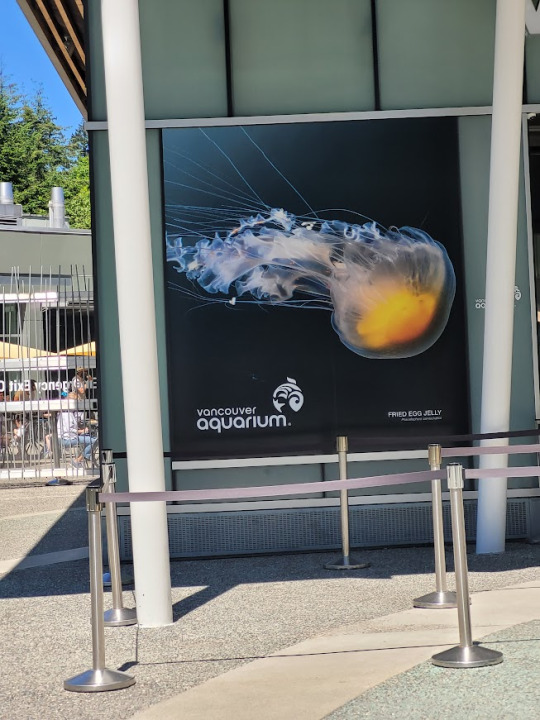
Unfortunately they 1) Do not currently show the Phacellophora camtschatica in the aquarium and 2) call it the "Fried Egg Jelly" (actually, it's not too big of a deal but I prefer to call it the "Egg Yolk Jelly" since the Mediterranean Jelly resembles a fried egg.
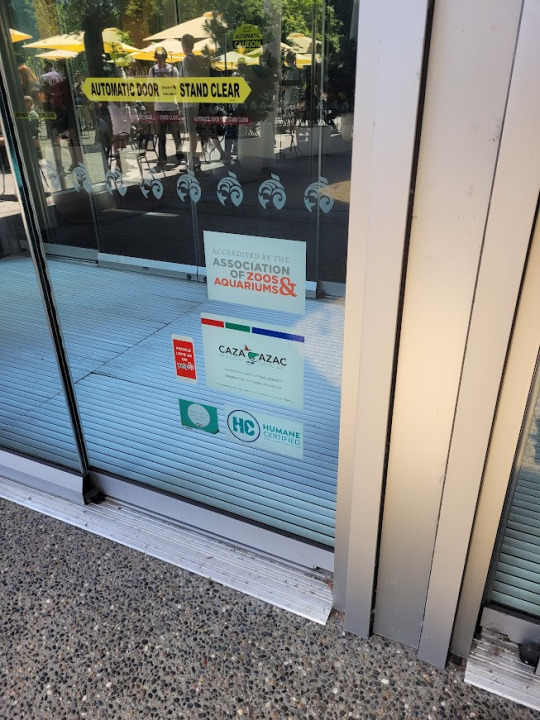
Hey, did you know that the Association of Zoos and Aquariums recently released a jellyfish care guide? I ended up quoting it when I talked to one of the staff, hehe
Now, most of their exhibits are divided by world region- but the jellyfish (as with most exhibits it seems) are grouped into one... except for the Papua Jellyfish, which is the first tank placed in the Tropical Exhibits.

It's verrrry large (larger than any rhizostomid exhibit I've seen) and there are many, many jellyfish! Unfortunately the strong light and deep blue background made it pretty difficult to get good individual pictures (all of mine came out blurry :<), but they were so cute and small.
The jellies often bumped into the ground, and one was swirling around on the bottom, unable to get back into the flow (perhaps it was in-between the two circular currents?). Anyways something told me that this exhibit wasn't as well-looked after as the other ones :<

I did see a couple of really broken ones (sorry for the bad lighting, but here was a jellyfish that had most of its bell ripped up), and it just broke my heart. Most of the jellyfish were in fine condition, though, so I think it's just the normal ripped bells and appendages that you can find in any jellyfish exhibit.
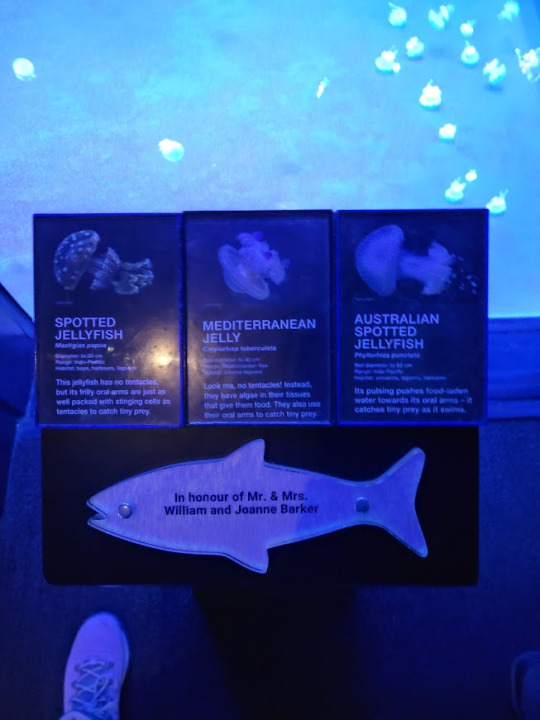
Curiously enough, however, this exhibit shows information cards for three different jellies when in reality there is only one species (The "Spotted Jellyfish") in the tank. I'll explain my theory why later when I get to them.

JELLYFISH HALL!!! There are many glowing sea nettles hanging from the ceiling, along with two life-sized lion's mane jellyfish!! :). The lion's manes also glow in different colours.
Also, if you notice, there's a very large crowd gathered in front of the sea nettle exhibit- and that's because I was INCREDIBLY, INCREDIBLY lucky to stop by RIGHT when they were doing a live jellyfish feeding. I cannot even begin to articulate how fortunate I was to accidentally stumble upon this.

Anyway, here's the obligatory jelly card haha :)
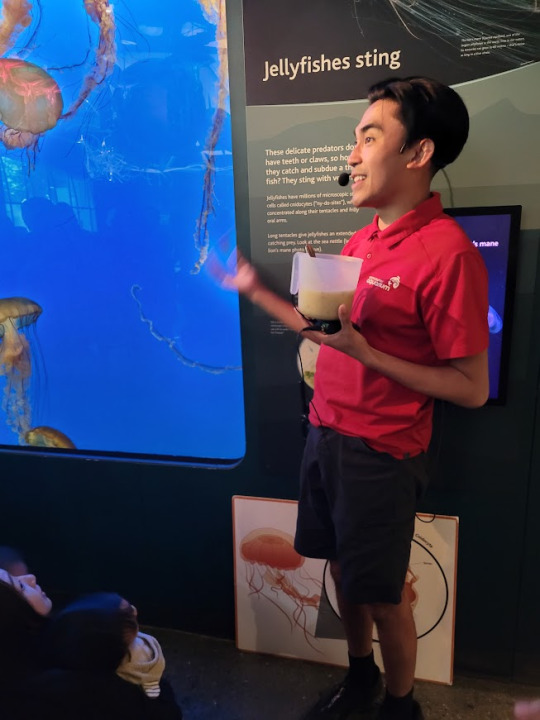
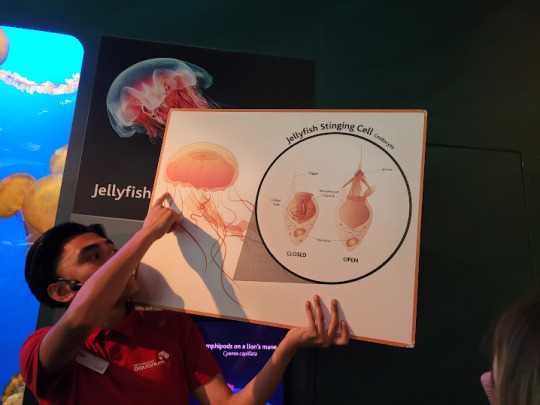
Here is speaker Noah, a 3rd year in his Marine Conservation degree showing us how amazing jellyfish are. I appreciate him a lot he gave me a lot of good information, which I'll just list down here:
The liquid inside of the measuring cup is in fact Jellyfish Food!
Usually, they are fed Artemis sp. naupili (sea monkeys, as he said it, or brine shrimp), but there were some other goodies added into the mix as well- like squid and herring.
This was all mixed in with a bit of gelatin- as sea nettles prefer to eat their food in bigger chunks.
These sea nettles are not fed with moon jellyfish- though the AZA Jellyfish Handbook does recommend to do that since sea nettles are medusivoric, and require jellyfish in their diet to grow properly. Apparently, the gelatin acts as an adequate substitute ^-^!!
Also Noah knows about the Monterey Bay Aquarium let's give him a round of applause ^-^!!! He said i should go there but. Well. I already did :3.
I could've went into more detail about the Cnidocyte explanation, but I'm probably not the best person to be teaching total beginners and children about jellyfish because I'd be way too technical (I was literally the only person in the crowd who was cheering lmao).

Here's a screenshot of the feeding video I took! (I'll upload the full feeding video if there's popular demand for it haha)
Anyways, after that excitement... it was time to look at the rest of the jellies.

This was the sign in front of the moon jelly exhibit. I just thought it was interesting to see what the aquarium defined as "Jellyfish" (this definition can vary from aquarium to aquarium)
Here, we can see that the Vancouver Aquarium considers Comb Jellies, Molluscs, and Salps as jellyfish. (this is more inclusive than my own personal definition- which excludes molluscs haha)
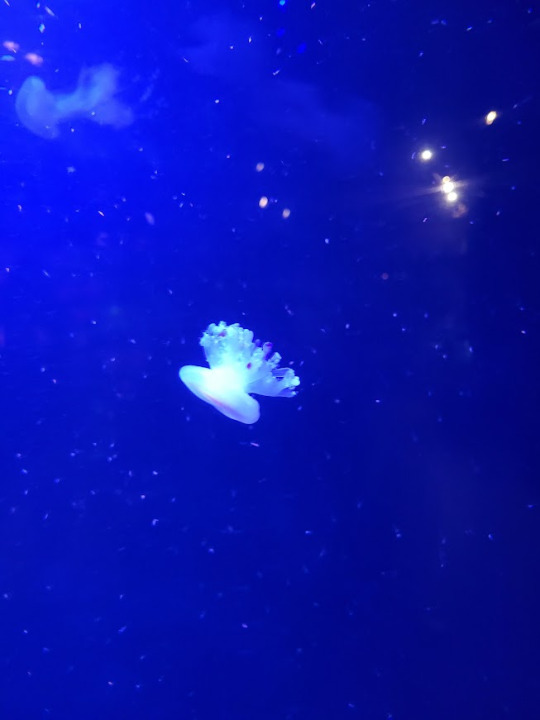

There was a bigger tank (that I did not take a full picture of... stupid Donut) that did include the Mediterranean and Australian Spotted jelly. They actually looked... a lot bigger in person than I thought, haha.
Now, I think the reason why these jellies were not roomed with the Papua jellies was because while they were originally a part of the exhibit, the two jellies actually outgrew the tank became too big to room with the small Papua jellies. These were housed in a tank that was about as big (if not bigger) than the Papua jelly tank- and there were not as many jellies per square meter in here.
Still weird that they kept the information cards about the jellies though... I guess it would've been too unsightly to remove?
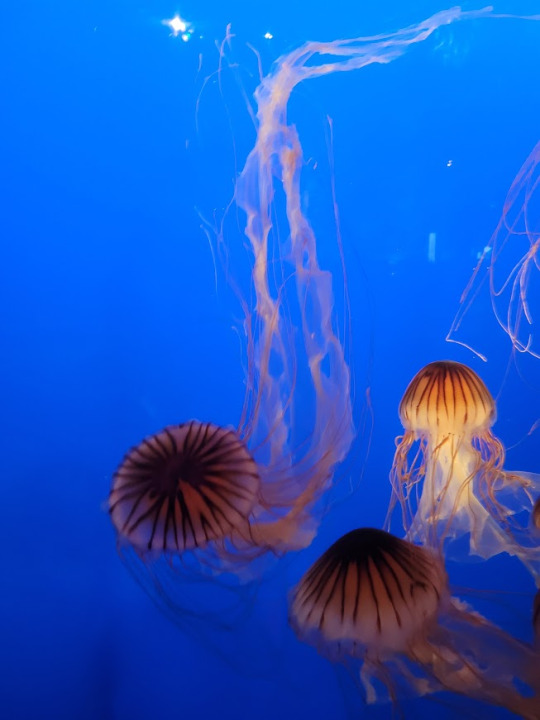
Ok, I also forgot to take a full view picture of this exhibit but don't be fooled by the pretty jellyfish. This exhibit was kind of... lacking, imo. I can only really describe it with a diagram of sorts.

This is a circular tank, but I'm guessing there were two opposing currents on either side. All of the sea nettles had migrated to the right current, making that half look too crowded and the other side completely empty. It didn't help that when all of the jellyfish were on the very shaded bottom, the entire tank was dark :(.
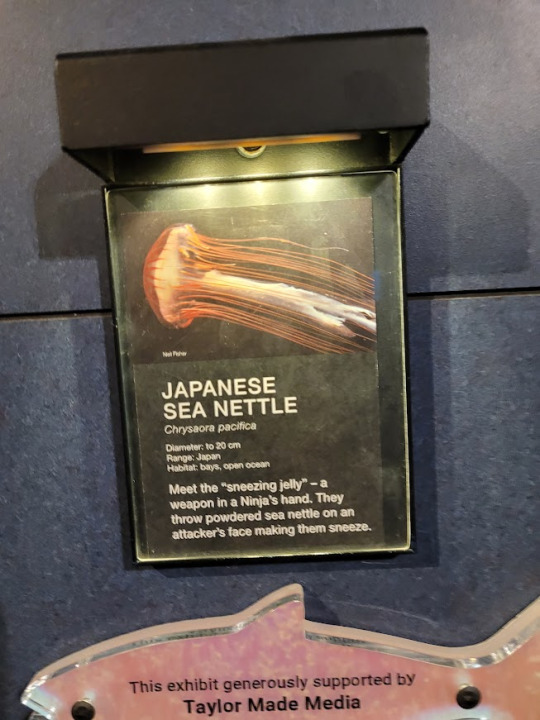
// Can we just say that them mentioning one of the Japanese names of the jellyfish is AWESOME? I've only seen this on the japanese wikipedia haha- though there was no mention of "Ninjas," only in military warfare in the Sengoku Period by Sanada Nobushige. Well. I'll correct my statement if it ends up being wrong later.

Quick break to visit my hero, Mackenzie Neale :). I'm a big fan of your work!!
Alright, now to visit the Moon jelly exhibit (it was honestly one of the most densely packed tanks I had ever seen- very impressive :>)
I made an instagram reel going over the sexual dimorphism of moon jellies- maybe I'll post it on here if I feel like it haha :3


^^ They have more infographics like this but this is the only one I took a picture of... awe :<.
OK, so with all of the main jellyfish out of the way... now started the hardest part of my journey: Finding the elusive, rare Staurozan (Stalked) jellyfish. These are so rare, apparently they're difficult for even scientists to get their hands on. I absolutely had to see them for myself.
Unfortunately... I kept running around in circles trying to find it (I had asked a staff member earlier where the exhibit was... but I forgot lol. I ended up having to ask two more people. It's tucked away in an unmarked Polar exhibit btw :>!!

Here was the gift shop I ended up visiting, there was a Japanese Sea nettle with a heart on it- awww
Anyways, I promise, after like 20 minutes of searching... I finally found the polar exhibits!!
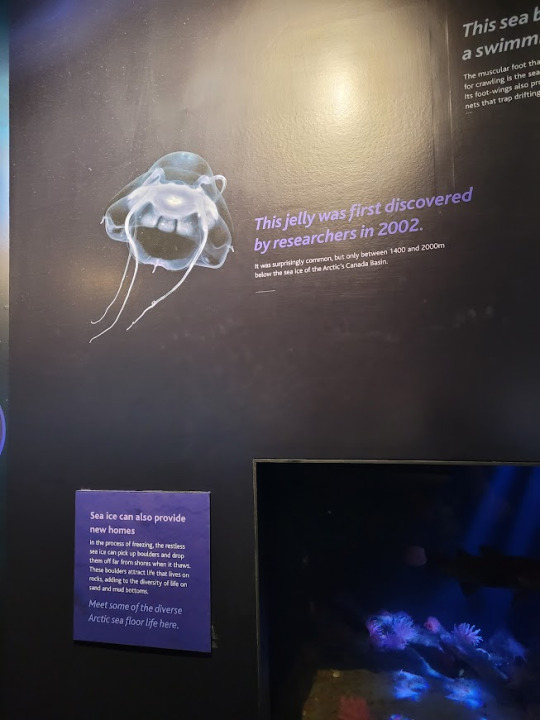
They had (one) hydrozoan jellyfish here... and it was a picture. An unnamed picture. For the record, it's called the "Battering Ram Jellyfish," according to Lisa-Ann Gershwin. It's a part of the Narcomedusae group, which have similarly positioned tentacles.
And now, in another fit of I did a dumb... I didn't take a picture of the two wall tanks... because the Vancouver Aquarium HAD to be confusing with them for some reason :/
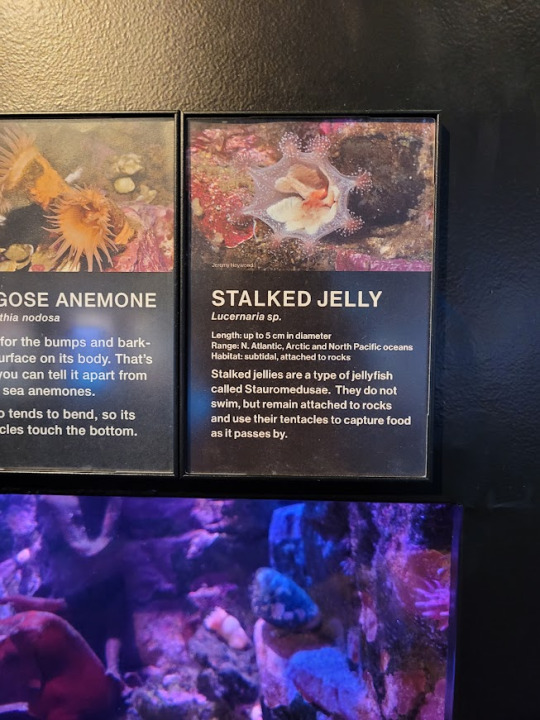
this is the tank on the left! It has the Stalked Jellyfish card......... but the tank itself has NO Stalked Jellyfish...? I had NO idea why and it's driving me mad.
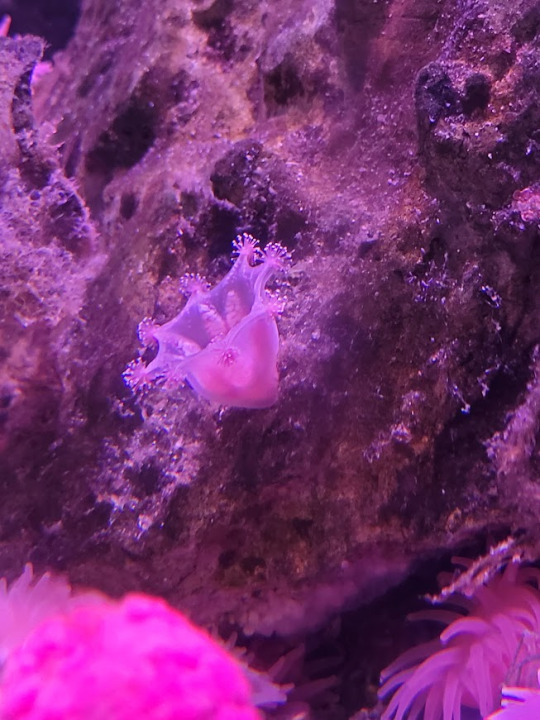
This tank was to the RIGHT of the tank with the card (ie. A TOTALLY SEPARATE TANK), BUT THESE ONES WERE THE ONES THAT HAD STAUROZOA?????... I have no words.
I actually ended up noticing them first because of their weird "firework-like" structure was different from the other corals, but I didn't know if they were actually staurozoa until I saw the card. Anyways, very confusing, but definitely the most magical and rewarding experience you could have in the aquarium. I'll leave out the directions to find this place so if anyone decides to visit the aquarium, they can just look for the staurozoa themselves :>
... and finally, that ends our jelly tour of the Vancouver Aquarium. Before you head home, though, why not pick up a cute little eco-friendly jelly plush on your way out?

She's a beauty, that's for sure!
#.aquarium reviews#.professor jellyfish speaks#jellyfish#pro tip: order tickets ahead of time. We paid $30 CAD more than we could've because we bought on the day of#by the way! this is the first time I've seen a Mediterranean Jelly in person. I'm in awe... they're so beautiful#also if you have a student id. BRING IT. There's student discounts :)#phacellophora camtschatica#aurelia aurita#cotylorhiza tuberculata#chrysaora fuscecens#mastigias papua#phyllorhiza punctata#chrysaora pacifica#lucernaria sp.#you have NO idea how happy I am to be tagging lucernaria this is the highlight of my entire trip istg
15 notes
·
View notes